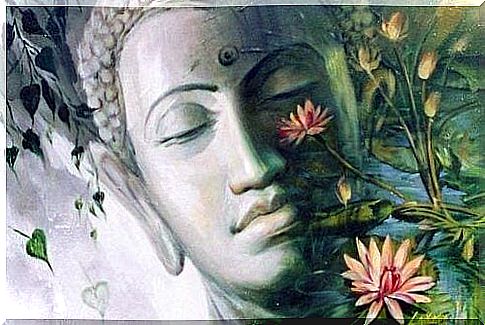Buddhism For Managing Emotions – 3 Practical Tips
Buddhism teaches us to control negative emotions and to silence them. You can achieve a lot through meditation and positive internal dialogue. Start putting these tips into practice today!

In Buddhism we find different strategies for coping with emotions that have something in common with Western psychology.
Both approaches assume that one can gain self-knowledge, develop personally and find the right path, especially through the analysis of negative emotions .
When you become aware of this, you can not only improve your physical and psychological health, but you can also better understand your being.
Practices like meditation are already taught in many therapies because they help to cope with emotions .
With it you can fight two dangerous and widespread enemies of everyday life at the same time: stress and nervousness.
Then we invite you to think with us about three keys of Buddhism that are very helpful in coping with emotions.
1. The desire to suffer or the freedom to be happy: the choice is yours!
On the way to more freedom and wisdom, psychology usually encourages us to accept our own feelings.
It is also important to remember past and present experiences in order to give them meaning and to achieve the management of emotions through therapy.

- In Buddhism, the approach to coping with emotions is slightly different: Here one is asked to silence and change negative feelings by practicing inner dialogue and meditation.
- The teachings of Buddhism also draws our attention to the fact that we sometimes make grave mistakes in our views and attitudes.
One of these mistakes is thinking that happiness can be found somewhere along the way, in a person, place, or longed-for material thing that we would like to have.
- But this kind of materialism or attachment to external things escapes our control and slowly leads us into disaster.
- True well-being is not to be found on the outside, but on the inside. In the mind that you make happy through calm, balance and self-acceptance.
2. Managing emotions through the practice of patience and love
We live in a world of immediacy in which stimuli of all kinds are in abundance.
The world of new technology makes us believe that everything has to happen right now, here and now.

Messages have to be answered as quickly as possible, information is shared within seconds, pictures and comments are published immediately, because one longingly expects a little recognition in the form of a “I like”.
- But real life has nothing to do with it. It has its own rhythm. Strong relationships are built very slowly in the magic of everyday life, they require patience, respect, and calm and wise tenderness.
- When we learn to be more patient, we can avoid emotions such as anger, jealousy, anger, or frustration.
- Stress and nervousness arise from the pressure of immediacy, the fear of tomorrow, the need to anticipate the future that is not yet there.
We must learn to embrace the present with patience!
3. The importance of switching off the ego
We all know people who always seem angry about everything.
- Nothing is okay, nothing is good enough, nothing meets expectations and nothing is psychological, moral or emotional on the required level of these people.
- They have such high standards and such a large ego that the world is too small for them, even though everything revolves around them.

This attitude to life causes a lot of suffering and makes you think that you are all alone in the world.
It is not easy to turn off the ego and there is a very specific reason for this: We recognize it in others, but we do not have the ability to see our own ego.
Consider the following simple strategies that will enable you to identify, control, and calm your own ego:
- Become aware of how your actions and words affect others.
- Identify your limits, your mistakes and your weak points.
- Learn to understand that others do not have to be what you ask them to be, that they do not have to do what you would like and do not have to meet your needs …
- Do not expect anything from others and everything from yourself, so you can live more balanced and calm.
- Learn to recognize your limits, be able to recognize the good things of those around you!
As you can see, Buddhism can give us a very interesting and enriching point of view to make it easier to cope with emotions.
One of the main goals of this teaching is to better understand one’s inner world in order to become responsible for one’s own happiness.
Start working on yourself today!
Cover picture kindly provided by © wikiHow.com









